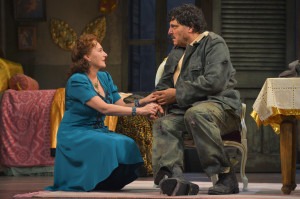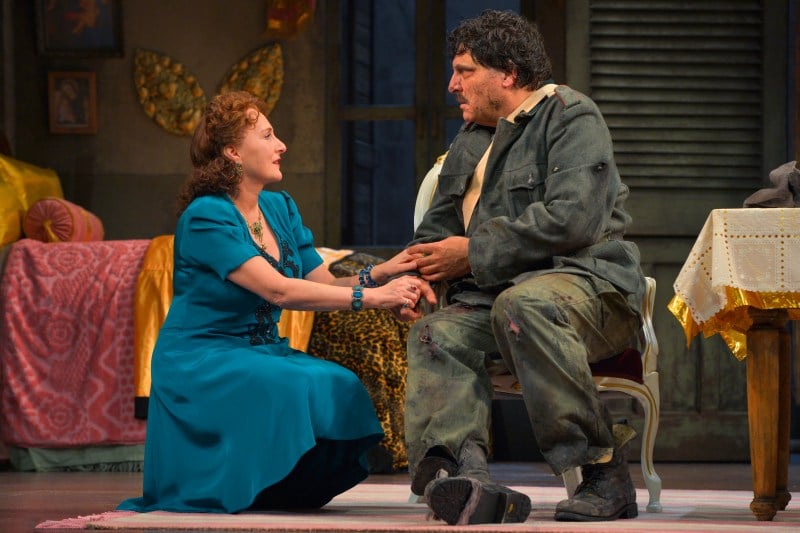
As much fun as the first act of “Napoli!” is, it’s somewhat surprising that Eduardo de Filippo’s WWII tale about the moral sacrifices necessary for survival in times of war has been revived today at the American Conservatory Theatre. It’s not that the “every-man-for-himself” mentality the characters start to espouse is outdated, but the preachy and patriarchal way in which the play makes its points, by having the father be the moral center who must correct the wrongs of his ambitious but short-sighted wife, is distasteful to modern audiences.
The play shares themes with Christopher Isherwood’s “Cabaret”, in which the characters are too wrapped up in their own party to see— or stop— the Nazis encroaching on them. But where “Cabaret” made its audience complicit in the selfish endeavors of its characters, reminding us that we, too, could easily fall into the trap of wondering “what’s politics got to do with us?”, “Napoli” lets its audience sit in condescending judgment of its characters, especially the female ones.
Director Mark Rucker’s production has a buoyant start, where we meet the central Jovine family: the patriarch and former soldier Gennard (Marco Baricelli); the plucky and enterprising matriarch, Amalia (Seana McKenna); the eldest child, Amadeo (Nick Gabriel), who is easily seduced by his mother’s upstart plans; and the eldest daughter, Maria Rosaria (Blair Busbee).
They live in a small flat in the Spanish quarter of Naples, where they manage to scrape by and feed themselves thanks to Amalia’s dalliances in the black market. The entire mattress of her bed is stuffed with coffee, and she keeps an assortment of other food hidden underneath her bed and throughout the flat. There’s a constant flux of customers arriving to purchase various goods, which she has learned to withhold at times in order to fetch a higher price the next day. The family must constantly watch the street behind their door, in case the authorities catch them in the middle of an illegal trade or speaking out against the fascist party. The set, designed by Erik Flatmo, is a key to the play’s success: It transports us effortlessly back into 1940s Naples and shows us the homey, if simple, abode where the Jovines live.
The first act is full of good fun, which culminates with a police officer arriving to inspect the place after getting tipped-off about Amalia’s business. Gennard is hilariously forced to play dead so the family can pretend to be in mourning and deflect the police officer’s question. Shenanigans ensue: The officer decides to play along and thus refuses to leave until Gennard’s body gets picked up by an undertaker, all the while trying to get him to admit he’s not actually dead.
Things start to go downhill after the intermission. When the curtain opens on Act Two, we see that Amalia has upgraded the furnishings of her flat to garish displays of her newfound wealth. What started as a business for survival has thrived enough to make her rich and insensitive to those who are now struggling. When a formerly rich neighbor (Anthony Fusco) is no longer able to pay his bills, she refuses to have mercy on him, buying out his property for a meager price and forcing his family into the streets. Of course, an extremely on-the-nose morality tale is to follow: She’ll eventually need his help and learn to regret her obstinacy.
While the Jovine family has been prospering, Gennard has been off having war adventures, which took him to a German work camp that he barely escaped. At the beginning of the second act, he’s presumed dead but returns, eager to be reunited with his family and tell his stories of hardships in the war. His family, however, are uninterested in his experiences: they can’t bare to deal with the harsh realities of the war, having become too caught up in their own financial successes that the war made possible. And as is this play’s modus operandus, it will fall to the patriarch to correct his wife’s wrongs.
“Napoli!” stars some of North America’s theater royalty, all giving wonderful performances in a play that isn’t really worthy of them. Seana McKenna is a star of the Canadian Stratford Festival and has wowed audiences in roles like the title character in Shakespeare’s “Richard III.” Her physicality and comic timing here are impeccable, but there’s just not enough on the page to make Amalia seem like a real and complicated person, although McKenna always keeps her compelling.
Former Shakespeare Santa Cruz artistic director Marco Bariccelli, meanwhile, plays Gennard as world-wearied and kind-hearted: he makes him sympathetic and well-meaning even as he’s forced to be somewhat chauvinistic. Even as the neighbor, Anthony Fusco has the thankless job of being the walking plot device to make Amalia realize her wrongs, and yet he makes the man caring, downtrodden and forgiving rather than a simple martyr. It’s easy to fall in love with the play in the first act— it’s just so much fun— and just as easy to fall just as quickly out of love with it in the second when it teaches its lesson.
Contact Alexandra Heeney at aheeney “at” stanford.edu.
